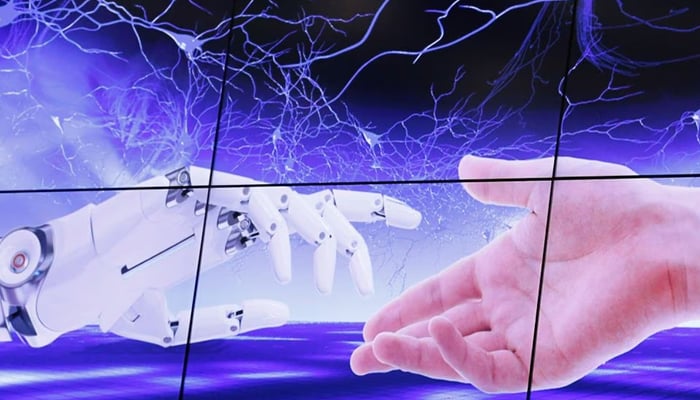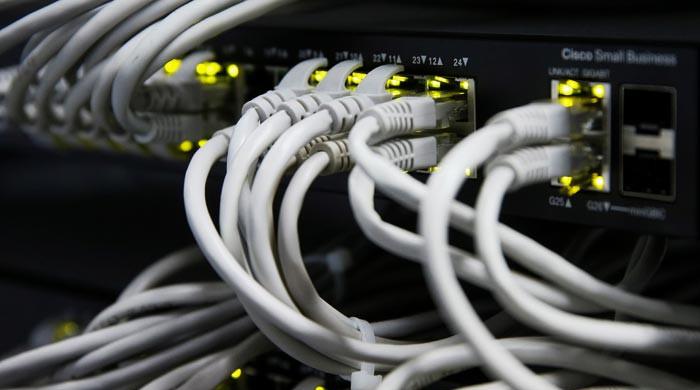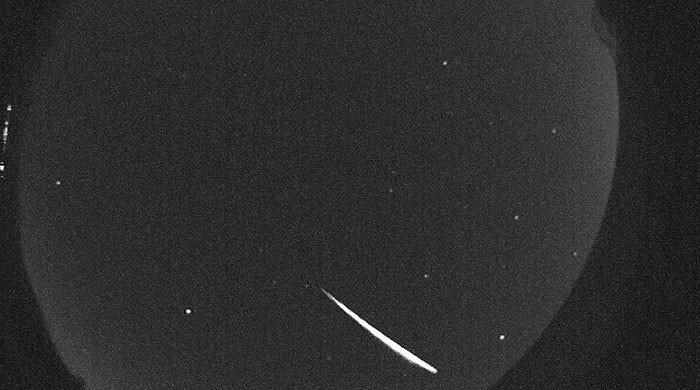Japanese AI manga: Threat to jobs or creativity booster?
AI image generators paved the way for people without artistic talent to make inroads into industry, says Rootport
March 06, 2023

TOKYO: The author of a science fiction manga about to hit shelves in Japan admits he has "absolutely zero" drawing talent, so turned to artificial intelligence (AI) to create the dystopian saga.
All the futuristic contraptions and creatures in "Cyberpunk: Peach John" were intricately rendered by Midjourney, a viral AI tool that has sent the art world into a spin, along with others such as Stable Diffusion and DALL-E 2.
As Japan's first fully AI-drawn manga, the work has raised questions over the threat technology could pose to jobs and copyright in the nation's multi-billion-dollar comic book industry.
It took the author, who goes by the pen name Rootport, just six weeks to finish the over-100-page manga, which would have taken a skilled artist a year to complete, he said.
"It was a fun process, it reminded me of playing the lottery," the 37-year-old told AFP.
Rootport, a writer who has previously worked on manga plots, entered combinations of text prompts such as "pink hair", "Asian boy" and "stadium jacket" to conjure up images of the story's hero in around a minute.
He then laid out the best frames in comic-book format to produce the book, which has already sparked a buzz online ahead of its March 9 release by Shinchosha — a major publishing house.
Unlike traditional black-and-white manga, his brainchild is fully coloured, although the faces of the same character sometimes appear in markedly different forms.
Still, AI image generators have "paved the way for people without the artistic talent to make inroads" into the manga industry — provided they have good stories to tell, the author said.
Rootport said he felt a sense of fulfilment when his text instructions, which he describes as magic "spells", created an image that chimed with what he had imagined.
"But is it the same satisfaction you'd feel when you've drawn something by hand from scratch? Probably not."
Soul-searching
Midjourney was developed in the United States and soared to popularity worldwide after its launch last year.
Like other AI text-to-image generators, its fantastical, absurd and sometimes creepy inventions can be strikingly sophisticated, provoking soul-searching among artists.
The tools have also run into legal difficulties, with the London-based start-up behind Stable Diffusion facing lawsuits alleging the software scraped large amounts of copyrighted material from the web without permission.
Some Japanese lawmakers have raised concerns over artists' rights, although experts say copyright infringements are unlikely if AI art is made using simple text prompts, with little human creativity.
Other people have warned that the technology could steal jobs from junior manga artists, who painstakingly paint background images for each scene.
When Netflix released a Japanese animated short in January using AI-generated backgrounds, it was lambasted online for not hiring human animators.
"The possibility that manga artists' assistants will be replaced [by AI] isn't zero," Keio University professor Satoshi Kurihara told AFP.
In 2020, Kurihara and his team published an AI-aided comic in the style of late manga pioneer Osamu Tezuka.
For that project, humans drew almost everything, but since then AI art has become "top-notch" and is "bound to" influence the manga industry's future, he said.
Humans still dominate
Some manga artists welcome the new possibilities offered by the technology.
"I don't really see AI as a threat — rather, I think it can be a great companion," Madoka Kobayashi, whose career spans over 30 years, told AFP.
AI can "help me visualise what I have in mind, and suggest rough ideas, which I then challenge myself to improve," she said.
The author, who also trains aspiring manga artists at a Tokyo academy, argues that manga isn't just built on aesthetics, but also on cleverly devised plots.
In that arena, "I'm confident humans still dominate."
Even so, she recoils at copying directly from computer-generated images, because "I don't know whose artwork they're based on".
At Tokyo Design Academy, Kobayashi uses figurines to help improve the students' pencil drawings, including details ranging from muscles to creases in clothes and hair whorls.
"AI art is great... but I find human drawings more appealing, precisely because they are 'messy'," said 18-year-old student Ginjiro Uchida.
Computer programmes don't always capture the deliberately exaggerated hands or faces of a real manga artist, and "humans still have a better sense of humour," he said.
Three major publishers declined to comment when asked whether they thought AI could disrupt Japan's human-driven manga production process.
Rootport doubts fully AI-drawn manga will ever become mainstream because real artists are better at making sure their illustrations fit the context.
But, "I also don't think manga completely unaided by AI will remain dominant forever."











